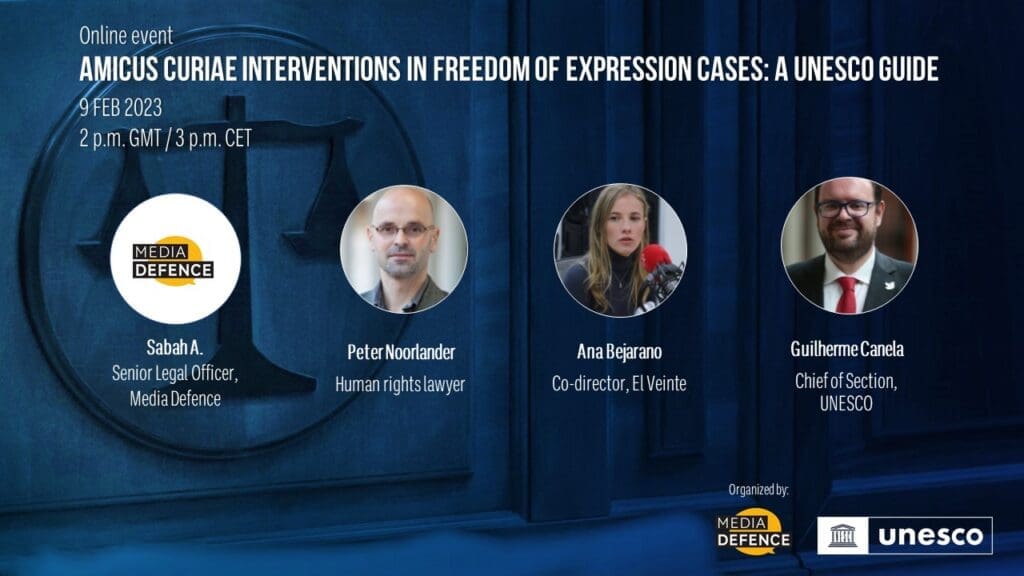On the 9th of February 2023 UNESCO and Media Defence hosted a webinar about UNESCO’s guide on amicus curiae interventions in freedom of expression cases.
The event was held in English and Spanish, with simultaneous translation to French, Spanish and English available to all attendees.
The context
The UNESCO guide aims to provide practical information and guidance to civil society organisations who consider intervening in cases before national or international courts as a so-called ‘amicus curiae’ or ‘third party intervener’. The guide focuses on cases concerning freedom of expression and the safety of journalists. However, the information it provides is broadly applicable to other human rights cases as well.
The webinar
The discussion was introduced and moderated by UNESCO’s Chief of Section for Freedom of Expression and Safety of Journalists, Guilherme Canela.
We heard from the author of the guide, international human rights lawyer Peter Noorlander:
“Amicus curiae” is a Latin term which literally means “friend of the court”. Often, an amicus curiae will be a third party intervener with an opinion to share in freedom of expression cases, with the intent of changing the law in a country for the better, or showing solidarity with a journalist on trial.
– Peter Noorlander.
Peter Noorlander was joined by Media Defence’s Senior Legal Officer, Sabah A., who spoke about Media Defence’s work intervening in freedom of expression cases around the world.
At Media Defence, we regularly intervene in cases where freedom of expression principles are being examined by the European Court of Human Rights, as well as other courts. When intervening in a freedom of expression case, our main aim is to contribute something to the Court’s understanding of the case. Our hope is that our intervention is able to provide the Court with a different perspective on freedom of expression.
– Sabah A., Media Defence.
We also heard from Colombian lawyer and Co-Director of El Veinte, Ana Bejarano:
In Latin America, amicus curiae interventions provide a rich mechanism to change the way constitutional judges view freedom of expression. We also hope that amicus curiae interventions can create a broader conversation in society about freedom of expression.
– Ana Bejarano, El Veinte.
Panellists
Sabah A, Senior Legal Officer, Media Defence.
Peter Noorlander, Human Rights Lawyer.
Ana Bejarano, Co-Director, El Veinte.
Guilherme Canela (moderator), Chief of Section, UNESCO.
Watch our previous webinar, during which we explored the challenges faced by journalists working with images, here.
Recent News
Landmark Ruling: Kenya’s High Court Declares Colonial-era Subversion Laws Unconstitutional
Media Defence welcomes the verdict of the High Court in Nakuru, striking down sections of the Kenyan Penal Code which criminalise subversion, citing them as relics of colonial oppression that curtail freedom of expression. Justice Samwel Mohochi, delivering the judgment, asserted that these provisions were overly broad and vague, stifling dissent rather than serving any […]
UN Rapporteurs Call for Protection of Brazilian Journalist Schirlei Alves
UN Rapporteurs Call for Protection of Brazilian Journalist Schirlei Alves Amid Defamation Charges Stemming from Rape Trial Coverage A letter dispatched by UN rapporteurs to the Brazilian Government calls for protective measures for women journalists covering cases of sexual crimes. The letter also denounces the conviction of Brazilian investigative journalist and women’s rights defender, Schirlei […]
Convite à apresentação de candidaturas: Cirurgia de litígio em português na África Subsariana
Cirurgia de litígio em português na África Subsariana Aplique aqui 23 a 25 de julho de 2024 em Nairobi, Quénia Prazo: 3 de maio A Media Defence está a convidar advogados sediados na África Subsariana que falem português a candidatarem-se a participar numa próxima cirurgia de litígio sobre o direito à liberdade de expressão e […]



